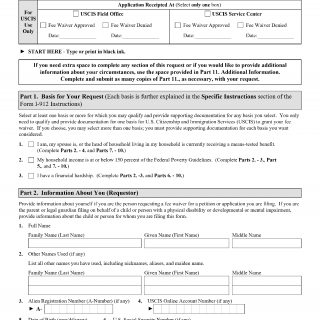Form I-912. Request for Fee Waiver
I-912, Request for Fee Waiver, is a form used by individuals who are unable to pay the filing fees for certain applications or petitions with the United States Citizenship and Immigration Services (USCIS).
The main purpose of the form is to request a waiver of the filing fees for eligible individuals who are unable to pay due to financial hardship. The form consists of three pages, with several sections that need to be completed.
The important fields on the form include the applicant's personal information, such as their name, address, and date of birth, as well as their financial information, including their income, expenses, and assets. The form also requires the applicant to provide a detailed explanation of their financial hardship and why they are unable to pay the filing fees.
The parties involved in the form are the applicant and the USCIS. It is important to consider that the information provided on the form must be accurate and truthful. Any false statements or misrepresentations could result in the rejection of the application.
When writing the form, the applicant will need to provide detailed information about their financial situation, including their income, expenses, and assets. They may also need to provide additional supporting documents, such as tax returns, pay stubs, or bank statements, to demonstrate their financial hardship.
Examples of practice and use cases for the form include requesting a waiver of the filing fees for naturalization, adjustment of status, or other immigration benefits. The form is necessary for the processing of the application and ensures that eligible individuals are not denied benefits due to their inability to pay the filing fees.
Strengths of the form include its ability to provide relief to individuals who are experiencing financial hardship and would otherwise be unable to apply for immigration benefits. Weaknesses may include the potential for delays in processing due to the need for additional documentation or verification of the applicant's financial hardship.
Related forms and analogues include other fee waiver forms required by the USCIS, such as the I-942 form for certain naturalization applicants. The difference between these forms is the type of benefit for which the fee waiver is being requested.
The form affects the future of the participants by allowing them to apply for immigration benefits without the burden of filing fees.
The form can be submitted online or in person at a USCIS office or authorized immigration service provider. Once submitted, the form is stored in the USCIS system for processing and review.

